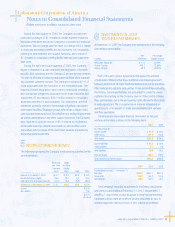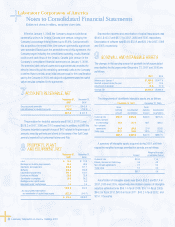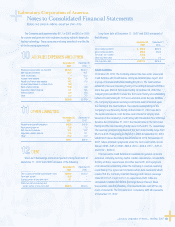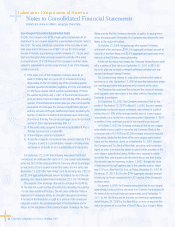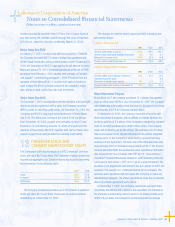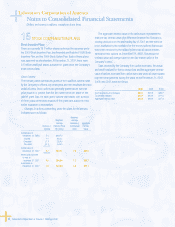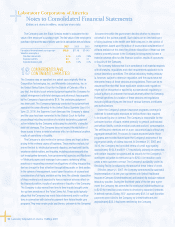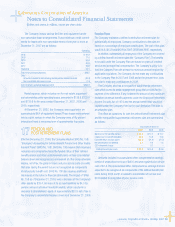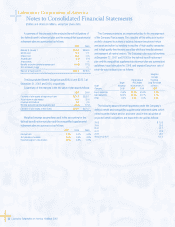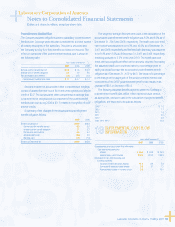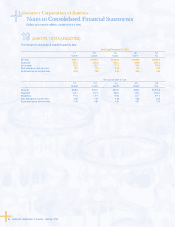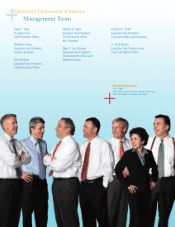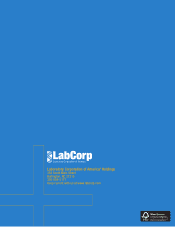LabCorp 2007 Annual Report Download - page 52
Download and view the complete annual report
Please find page 52 of the 2007 LabCorp annual report below. You can navigate through the pages in the report by either clicking on the pages listed below, or by using the keyword search tool below to find specific information within the annual report.
Notes to Consolidated Financial Statements
(Dollars and shares in millions, except per share data)
50 Laboratory Corporation of America® Holdings 2007
The Company uses the Black-Scholes model to calculate the fair
value of the employee’s purchase right. The fair value of the employee’s
purchase right and the assumptions used in its calculation are as follows:
2007 2006 2005
Fair value of the employee’s purchase right $16.98 $11.48 $14.40
Valuation assumptions
Risk free interest rate 4.1% 5.0% 2.8%
Expected volatility 0.3 0.1 0.1
Expected dividend yield 0.0% 0.0% 0.0%
COMMITMENTS AND
CONTINGENT LIABILITIES
The Company was an appellant in a patent case originally fi led by
Competitive Technologies, Inc. and Metabolite Laboratories, Inc. in
the United States District Court for the District of Colorado. After a
jury trial, the district court entered judgment against the Company for
patent infringement, with total damages and attorney’s fees payable
by the Company of approximately $7.8. The underlying judgment
has been paid. The Company vigorously contested the judgment and
appealed the case ultimately to the United States Supreme Court. On
June 22, 2006, the Supreme Court dismissed the Company’s appeal
and the case has been remanded to the District Court for further
proceedings including resolution of a related declaratory judgment
action initiated by the Company addressing the plaintiffs’ claims for
post trial damages. The Company does not expect the resolution of
these issues to have a material adverse effect on its fi nancial position,
results of operations or liquidity.
The Company is also involved in various claims and legal actions
arising in the ordinary course of business. These matters include, but
are not limited to, intellectual property disputes, professional liability,
employee related matters, and inquiries, including subpoenas and other
civil investigative demands, from governmental agencies and Medicare
or Medicaid payers and managed care payers reviewing billing
practices or requesting comment on allegations of billing irregularities
that are brought to their attention through billing audits or third parties.
In the opinion of management, based upon the advice of counsel and
consideration of all facts available at this time, the ultimate disposition
of these matters is not expected to have a material adverse effect on
the fi nancial position, results of operations or liquidity of the Company.
The Company is also named from time to time in suits brought under
the qui tam provisions of the False Claims Act. These suits typically
allege that the Company has made false statements and/or certifi ca-
tions in connection with claims for payment from federal health care
programs. They may remain under seal (hence, unknown to the Company)
for some time while the government decides whether to intervene
on behalf of the qui tam plaintiff. Such claims are an inevitable part
of doing business in the health care fi eld today and, in the opinion of
management, based upon the advice of counsel and consideration of
all facts available at this time, the ultimate disposition of those qui tam
matters presently known to the Company is not expected to have a
material adverse effect on the fi nancial position, results of operations
or liquidity of the Company.
The Company believes that it is in compliance in all material respects
with all statutes, regulations and other requirements applicable to its
clinical laboratory operations. The clinical laboratory testing industry
is, however, subject to extensive regulation, and the courts have not
interpreted many of these statutes and regulations. There can be no
assurance therefore that those applicable statutes and regulations
might not be interpreted or applied by a prosecutorial, regulatory or
judicial authority in a manner that would adversely affect the Company.
Potential sanctions for violation of these statutes and regulations
include signifi cant fi nes and the loss of various licenses, certifi cates
and authorizations.
Under the Company’s present insurance programs, coverage is
obtained for catastrophic exposure as well as those risks required
to be insured by law or contract. The Company is responsible for the
uninsured portion of losses related primarily to general, professional
and vehicle liability, certain medical costs and workers’ compensation.
The self-insured retentions are on a per occurrence basis without any
aggregate annual limit. Provisions for losses expected under these
programs are recorded based upon the Company’s estimates of the
aggregated liability of claims incurred. At December 31, 2007 and
2006, the Company had provided letters of credit aggregating
approximately $104.8 and $111.7 respectively, primarily in connection
with certain insurance programs and as security for the Company’s
contingent obligation to reimburse up to $200.0 in transition costs
under a new customer contract. The Company’s availability under its
Revolving Facility is reduced by the amount of these letters of credit.
Effective January 1, 2007, the Company commenced its successful
implementation of its ten-year agreement with United Healthcare
Insurance Company (UnitedHealthcare) and became its exclusive national
laboratory provider. During the fi rst three years of the ten-year agree-
ment, the Company has committed to reimburse UnitedHealthcare up
to $200 for transition costs related to developing expanded networks
in defi ned markets. During 2007, approximately $38.3 of such transition
payments were billed to the Company by UnitedHealthcare and
approximately $32.0 had been remitted by the Company.
Laboratory Corporation of America



